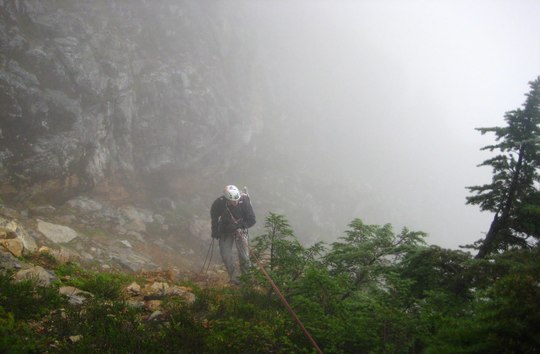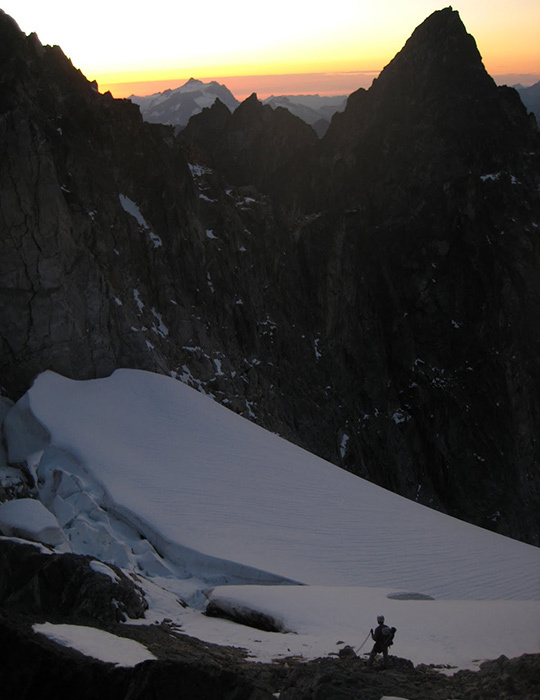
The block had fractured cleanly, and may have already been broken and waiting for hundreds of years. It was on the cleanest, steepest and–for me–best route in the Cascades’ Picket Range. The East Ridge of Inspiration Peak, a crest of swirling and gnarled black and white stone, was first climbed by Fred Beckey, Dave Collins and Ed Cooper in 1958. The fine-grained metamorphic rock has fractured into clean edges and sharp, biting flakes, providing a welcome reprieve from the down-sloping choss and lichen gardens adorning peaks in both directions.
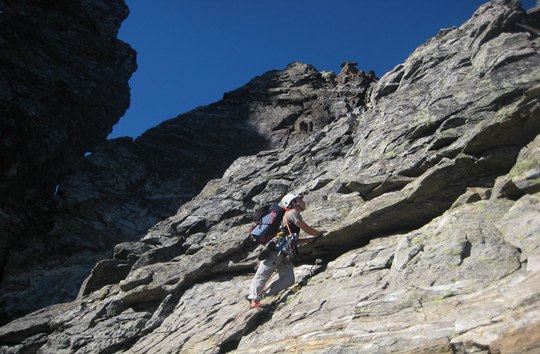
The best pitch, on this, the best route, follows a straight-in hand crack connecting flakes and edges up high, to the terraced and blocky terrain low down. It cuts through a blank slab, and its existence remains hidden until arriving at the base, a slanting pillar cleanly sheared off into a stance the size of a doormat. The splitter is one of those features–a geologic anomaly more than a predictable system–that connects the key dots and makes a route go, when it feels like it should dead-end. Climbing these pitches is like sneaking through an open window that was somehow, against all odds, left unlocked. It feels absurdly easy and a little bit like cheating. And it leads exactly where it should, exactly where a climber would want it to. The crack is a passage through the best pitch on the wall. But the block sat perched, more guillotine than windowpane. The best pitch in the Pickets was waiting to slam shut.
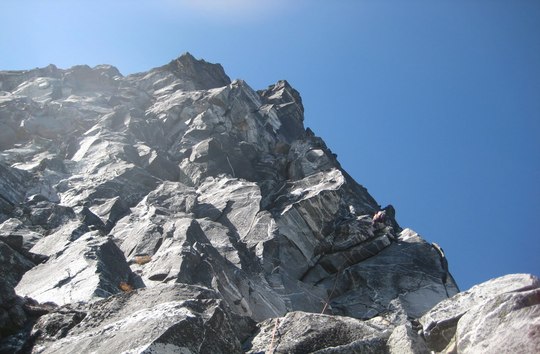
Sol Wertkin and I, a team of Washington climbers in our twenties, were attempting the second ascent of the Southern Pickets Traverse. We had done a few new routes together in the North Cascades, myself a 20-year-old undergrad and Sol the stronger veteran a decade my senior. The Southern Traverse is a multi-day choss tour following a ridge of mostly 5.8 filth amid some of the best views and wildest terrain in the country. It covers 14 named peaks and an equal number of unlabeled bumps and towers. Sol and I hadn’t made it as far as we had hoped on Day 1, becoming disoriented amid unnamed spires between the McMillan Peaks. The itinerary of the first ascent, done by Pickets veterans Mark Bunker, Colin Haley and Wayne Wallace, provided a benchmark we hoped to catch up to by the end of our second full climbing day.
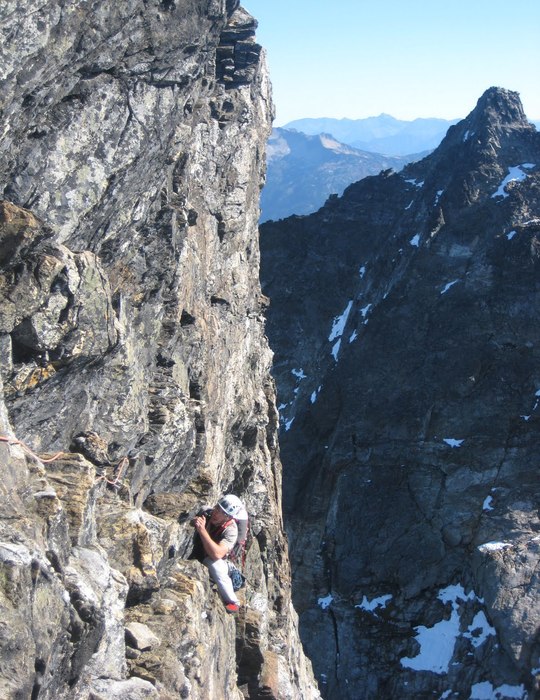
Unlike nearby mounts Terror and Fury, the name “Inspiration” doesn’t compote with ominous area reputation. Low on the route, the rock was living up to our expectations, inspiring us to rally our heavy packs. These, finally, were holds I could trust and features I could pull out on without tedious testing. I started up the splitter. Sol slipped off his climbing shoes and wiggled bare toes stained red by spending 24 of the past 36 hours in a new pair of Moccasyms. Our single lifeline, an 8mm half rope, dangled freely below as I spaced out our three hand-sized pieces.
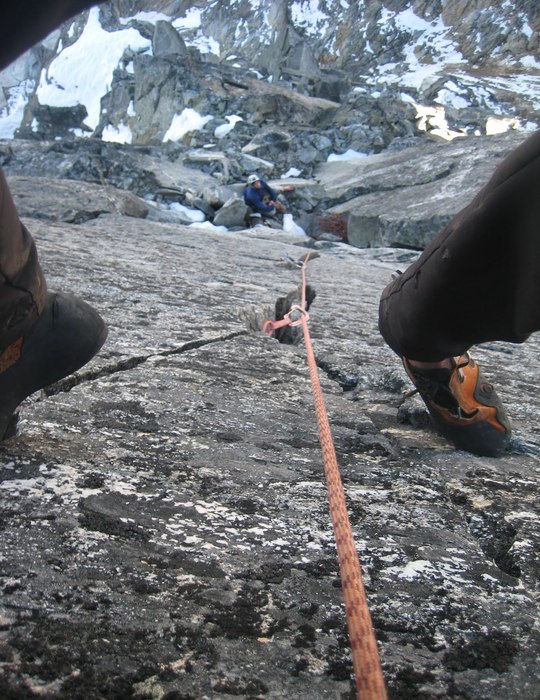
The splitter peters out just as face holds reappear, and I stemmed rightward onto a square edge, expecting a few meters of easy face climbing to bring me to a belay. Rather than stepping on to a hold, I had the sudden sensation of stepping through a hold and was falling rightward, out of the crack, my right leg passing through billowing dust and a gap newly vacated. Below me, and falling much faster, was a squared-off block of gneiss. I probably thought rock or falling and probably screamed as much. Sol heard something, or saw something, and that probably saved our lives.
I don’t know how many September freezing rainstorms, March blizzards and August sunrises it had taken to shear the block away from the wall. But it had cracked along a base slanting steeply down and out. The result was a small oven of stone balanced on a hidden slab, imbedded into the face. With one careless foot placement, I had turned our window through the wall into a trapdoor.
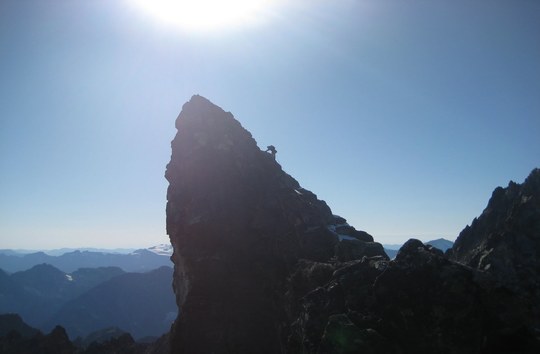
Sol jumped back from his stance, coming tight against the clove hitch keeping him on the wall. An impossible limbo bend, like something from an action movie, kept him mostly free from the line of fire. The smell of gunpowder and smashing echoes surrounded us. I had fallen but been unhurt. Sol’s rock shoes had taken a pounding, and he had a few cuts on his legs and feet. But our packs, the rope and ourselves were fundamentally unharmed. I blinked amid the sudden silence.
The words between us were predictable and meaningless after establishing that we were both OK. I trembled up the pitch and mentally limped along the final stretch to the summit and down the other side. The night ended with us both “oozing” upward on vertical 5.10 choss pitches as we accidentally climbed a new route on The Pyramid in near darkness. A bivy was hacked out. Water was melted. Inspiration lay behind us. We looked ahead to Terror.
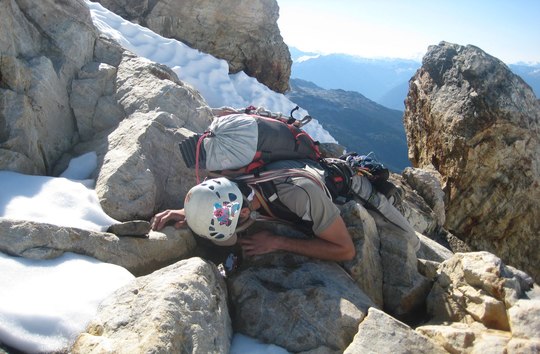
The next morning dawned cloudy, but we didn’t need the pretense of a storm to compel our retreat. We reached an old logging road late the next day, following hours of storm-soaked forest rappels, slide alder navigation and one morale-rebuilding brew stop to drink tea under a boulder as the rain poured around us. Having survived its best pitch, five years ago, I haven’t climbed in the Pickets since.
